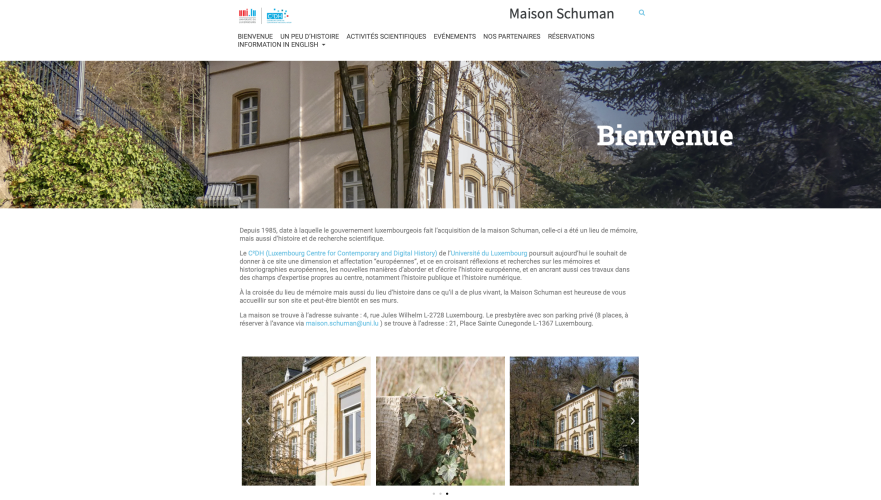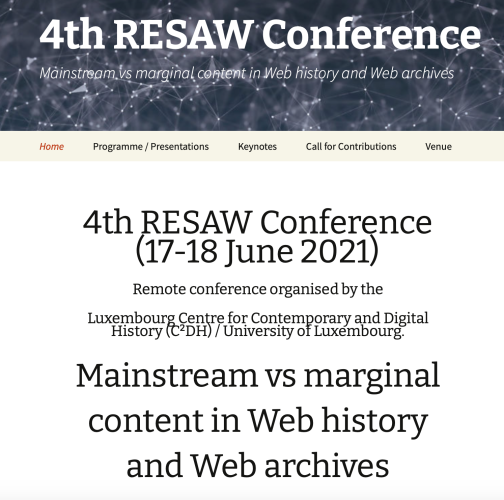2021 in review
Contemporary history of Europe
Author: Valérie Schafer, head of the research area "Contemporary history of Europe"
European histories and memories
The Contemporary History of Europe (EHI) team looks at the contemporary history of Europe from the perspective of networks, focusing on infrastructures, experts and media, on economic, migratory and communication flows, on dissenting voices and collective memories. Coordinated by Valérie Schafer, the team is composed of around 15 researchers, embraces a dynamic approach that seeks to incorporate the multifaceted possibilities offered by digital history methods and to bridges the gap between academic research and communication with European stakeholders and citizens. The three EHI flagship projects were developed in 2021: (1) Networks, flows and interactions, (2) Digital cultures and memories, (3) The Luxembourg financial centre and its role within Europe.
The EHI team as a meeting place for the study of European history
Besides the strong involvement of the team in teaching activities (and notably at the Master’s level at the University of Luxembourg, within the MAHEC), several research seminars were organized in 2021: the European seminar led by Adelina Stefan (5 sessions) welcomed scholars like Kiran Patel or Pavel Szobi. The seminar related to the financial place organized by Benoît Majerus was also an active place for discussions, as was the VIRAL seminar organized on a monthly basis by Fred Pailler and Valérie Schafer on topics related to online virality and digital cultures. Elena Danescu also organized a “Winter online lecture series” dedicated to European history. Her application for Europe Direct University Luxembourg (2021-2025) funded by the European Commission was successful and will lead to further developments in the coming years (ED_UNILU 2021-2025 (Ares1299176).

To make the C2DH and the EHI team an even more concrete place to meet and gather around European topics a task force related to Maison Schuman in Luxembourg City was formed, with the goal of developing research activities. May it be to disseminate events related to the heritage of the house (participation to LUGA25) or scientific activities organized around a new writing and narrative of the European history, the Maison Schuman has now a new website that may welcome the general public, researchers and stakeholders interested in the European heritage and history.

Networks and research
The team’s interest in the networks underpinning Europe is mirrored by its active involvement in European academic networks. Frédéric Clavert and Valérie Schafer organized a week related to web archiving in June 2021 and the 4rth RESAW conference. With more than 100 participants this conference allowed to remotely welcome scholars from the whole Europe who are interested in web archives and to collaborate on this event with the BnL.

In July 2021, the Tensions of Europe remote festival was also a chance to actively participate to this European network interested in the history of technology, with two panels, one on the topic of European born-digital heritage and the second one on the history of media. With the participation of Frédéric Clavert in the French ANR-funded Crobora (Crossing Borders Archives) project and his strong involvement in the Journal of Digital History and with activities linked to the born-digital heritage of the COVID crisis (European WARCnet project), the team is a key player in research on Europe’s digital cultures and memories and digital history in a broad sense.
These research activities are also supported by several funded projects like the Hivi project funded by the FNR on virality and digital cultures; the COST action SlowMemory, with the participation of Frédéric Clavert; the Popkult60 project, a FNR-DFG project related to the history of popular cultures in the 60s, which is transversal to several teams of C2DH; or the launch thanks to Benoit Majerus of the FNR-DFG project, IN#SANE, with partners in Düsseldorf, Heidelberg, Berlin, Lübeck, Bochum and Dresden. The project related to the historian Gilbert Trausch also led to an online-workshop on March, 5th, 2021: “At Work in the Library: Intellectual and Material Practices of Historians in the 20th Century”.


